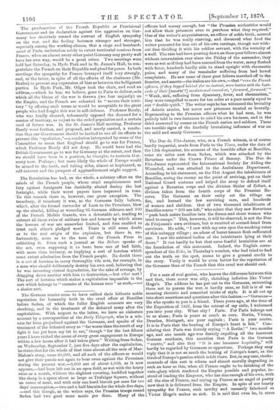The Revolution has had, on the whole, a salutary effect
on the minds of the French people, whose cruel suspiciousness and fury against foreigners has decidedly abated during the last fortnight, while their worst papers have improved in tone. To this remark there is, however, one great exception. The treachery, if treachery it was, as the Germans fully believe, which, after the formal surrender of Laon to the Prussians, blew up the citadel, killing or wounding 95 German riflemen and 300 -of the French Mobile Guards, was a detestable act, tending to subvert all those rules of military law and honour by which alone the horrors of war are somewhat limited, and foes enabled to trust each other's pledged word. There is still some doubt as to the real origin of the explosion, but there is, un- fortunately, none as to the tone of the French Press in criticizing it. Even such a journal as the Debats speaks of the act, even supposing it to have been one of bad faith, with more than leniency, as implying a sort of heroism which must extort admiration from the French people. No doubt there is a sort of heroism in many thoroughly vile acts, for example, in a man who should deliberately destroy his own soul, believing that he was incurring eternal degradation, for the sake of revenge, by dragging down another with him to destruction,—but what sort ? The sort of heroism which makes a capitulation impossible is the sort which belongs to " enemies of the human race " as such,—not a choice sort.






























 Previous page
Previous page